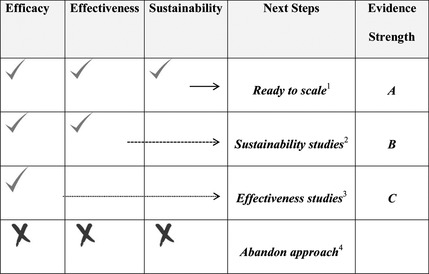Figure 1.

Grading the evidence for global public health practice recommendations. 1Evidence strength A indicates adequate to strong efficacy, effectiveness, and sustainability data. Additional implementation science data to optimize adaptation to a specific country context, health system, etc., may be needed. 2Evidence strength B indicates adequate efficacy and effectiveness data but a need for additional sustainability data for LMICs. Sustainability and implementation data to assess elements critical to country context, such as: cost, demand creation, expanded access, integration into health care system, etc. 3Evidence strength C indicates the need for effectiveness studies in larger and more diverse populations and varying contexts. Identification of context specific factors that enhance or impede effectiveness should both be prospectively included in study designs and be reported in peer-reviewed journals. 4Negative results from well-designed studies at any stage should lead to abandoning the intervention of approach for intended behavioral change area rather than allocating additional resources in other settings. Negative results should be published in open access peer-review journals to ensure others do not waste resources repeating an ineffective intervention. This will enable cost savings and prevent wasting resources on ineffective programs and interventions.
